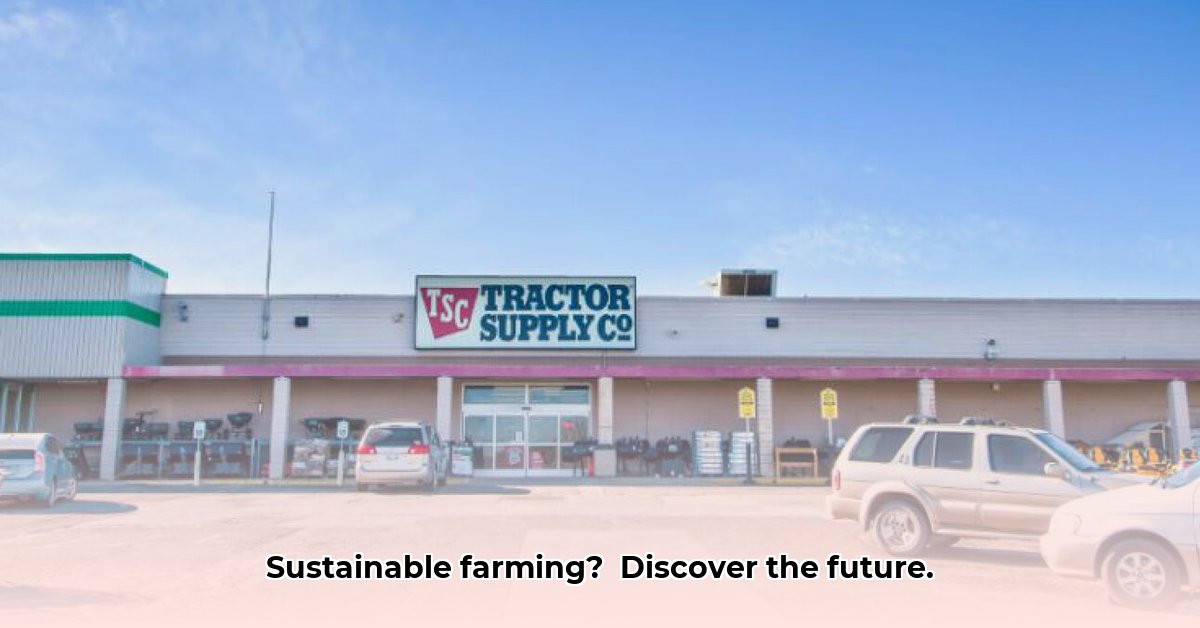
Assessing Tractor Supply's Role in Sustainable Agriculture in Bristow, Oklahoma
Bristow Tractor Supply's (BTS) convenient location near major highways offers readily accessible resources to farmers in Bristow and surrounding towns like Depew, Kellyville, Slick, Milfay, and Shamrock. However, its impact on sustainable farming practices requires deeper analysis beyond mere accessibility. Does this convenience translate to the adoption of environmentally friendly techniques? This article investigates BTS’s contribution to sustainable agriculture, presenting data-driven analysis and actionable recommendations. For information on tractor parts, check out this resource.
Accessibility: A Necessary but Insufficient Condition for Sustainability
The proximity of BTS to local farmers undeniably enhances efficiency, saving time and fuel costs. However, convenience alone does not guarantee sustainable practices. The critical question is whether this accessibility facilitates the adoption of eco-friendly products and methods. Currently, data on the percentage of organic or environmentally friendly products sold by BTS, or their promotion of sustainable practices, remains unavailable. This gap hinders a comprehensive assessment of BTS's true impact.
Sustainable Practices: A Missing Data Point
Quantifiable data is crucial to evaluating BTS's role in sustainable agriculture. Key metrics remain unmeasured:
Product Sustainability: What percentage of BTS's products (seeds, fertilizers, pesticides) are certified organic or environmentally friendly? Without this data, it's impossible to accurately assess the extent to which the store actively supports sustainable farming.
Sustainable Practices Promotion: Does BTS actively advise farmers on water conservation, soil health, integrated pest management, or other sustainability techniques? Are educational resources available in-store or online?
Supply Chain Transparency: Where are BTS's products sourced? Are local suppliers prioritizing sustainable practices? Understanding the supply chain's environmental impact is critical for assessing overall sustainability.
The absence of precise data on these crucial aspects limits our ability to offer definitive conclusions on BTS's current contribution to sustainable agriculture. A robust data collection effort is urgently needed.
Local Connections and Supply Chain Analysis: A Pathway to Sustainability?
BTS's potential to support a sustainable local food system is significant, given its regional reach. Shorter transport distances inherently reduce the carbon footprint associated with farm supply delivery. However, the true extent of this benefit hinges on the sustainability of BTS's own supply chain. Prioritizing local suppliers committed to ecological responsibility would significantly amplify the positive environmental impact.
This requires further investigation into the sourcing of key products like seeds, fertilizers, and other agricultural inputs. Are these products sourced locally, nationally, or internationally? What environmental certifications (e.g., organic, Fair Trade) do these products meet? Detailed analysis of the supply chain is critical for a credible assessment.
Actionable Recommendations for a Greener Future: A Multi-Stakeholder Approach
Achieving sustainable agriculture requires a collaborative effort. The following actionable steps can improve sustainability outcomes:
Enhance Data Collection and Transparency (Bristow Tractor Supply & Oklahoma State Government): Conduct a comprehensive inventory of BTS's products, categorizing them by sustainability criteria. Publish this data publicly. The Oklahoma State Government can support this effort with funding for research and data analysis. (Efficacy metric: goal of 90% data transparency within 2 years)
Promote Sustainable Practices (Bristow Tractor Supply & Agricultural Researchers): BTS should partner with agricultural researchers to implement educational programs on sustainable farming techniques for local farmers. These programs could include workshops, in-store materials, and online resources. (Efficacy metric: goal of participating 75% of local farmers' participation within 3 years)
Incentivize Sustainable Sourcing (Bristow Tractor Supply & Local Suppliers): BTS should incentivize local suppliers to adopt and maintain sustainable agricultural practices. This might involve preferential pricing, guaranteed minimum purchases, or joint marketing initiatives. (Efficacy metric: goal of 50% of supplied products meeting sustainable criteria)
Policy Support (Oklahoma State Government): Implement policies that incentivize sustainable agriculture through tax breaks, subsidies, or grants for organic farming and water conservation programs. (Efficacy metric: goal of a 15% increase in sustainable farming practices over 5 years)
Moving Forward: The Path to Informed Decision-Making
This analysis highlights several critical knowledge gaps that must be addressed to fully understand Bristow Tractor Supply's contribution to sustainable agriculture. Further research is needed to gather detailed data on product sourcing, sustainability initiatives, and the impact of these initiatives on local farmers’ practices. These findings will be crucial for crafting effective strategies that support both farmers and a healthy environment. Transparency and collaboration among all stakeholders are imperative for achieving sustainable agricultural practices in the Bristow area and beyond.